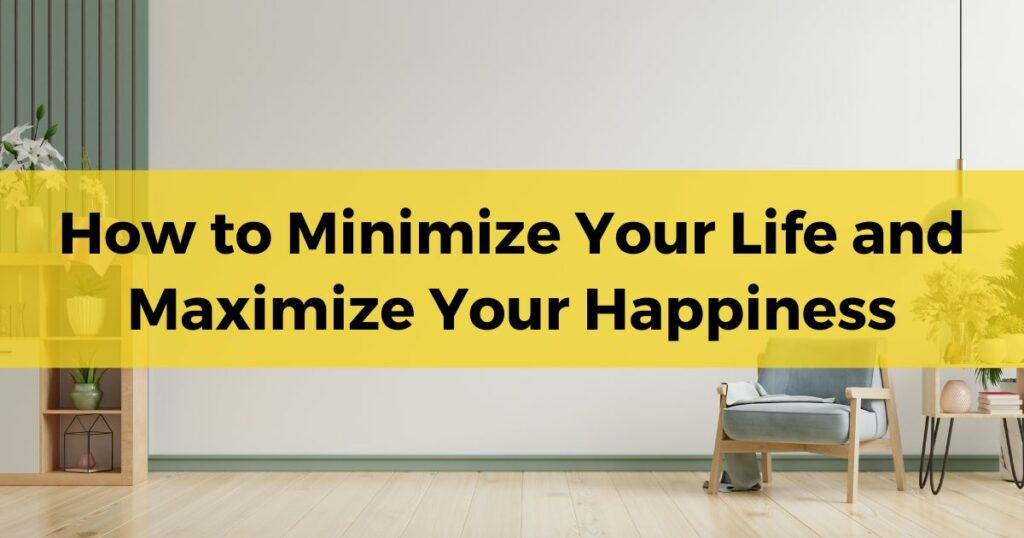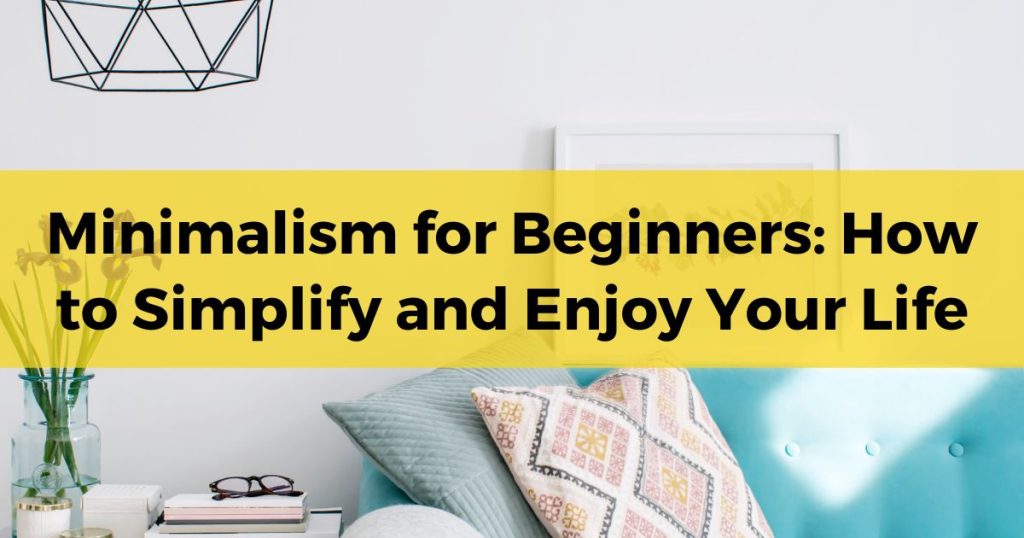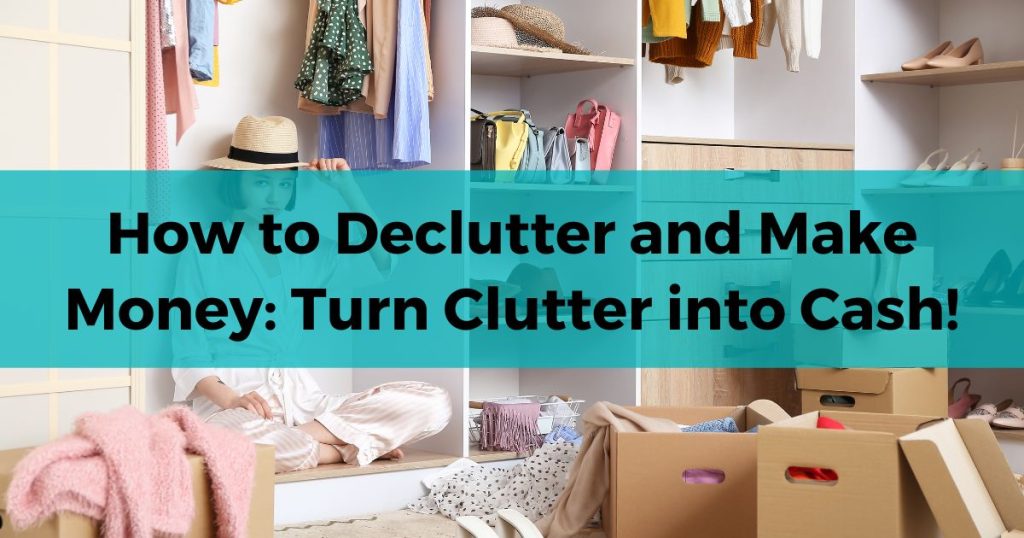Do you ever feel overwhelmed by the amount of clutter in your life? I’m not just talking about stuff, but everything. Sick and tired of the amount of crap you have, things you have to do, financial obligations, and more!
You read books and watch shows to learn how to fold and organize your life into cute little boxes, but you never really feel better about the clutter.
I remember reorganizing every couple of months, thinking this would help me to get into a better daily routine or (maybe, just maybe) help me feel less overwhelmed. But, no matter how much I organized my calendar, email, clothes, and home, it still felt like I was drowning.
I realized I needed to minimize instead of organize! I slowly adopted a minimalist mindset, not just with the amount of stuff I had but how I spent my time and money.
A minimalist lifestyle answered my long-asked question, “What can I do to feel less overwhelmed with everything?”
Does this sound like you? If you’re feeling stuck, overwhelmed, and craving simplicity, keep reading because I have some tips for how to minimize your life.
Disclaimer: This post may contain affiliate links. This means I receive a small commission, at no extra cost, if you purchase using the links below. Please see my earnings disclaimer for more details.
Table of Contents
What does a minimalist lifestyle mean?
Minimalism is a way of life that embraces simplicity. It’s about removing unwanted clutter from all aspects of our lives.
A minimalist lifestyle is a great way to help you live a more intentional and enjoyable life.
Why should you minimize your life?
Recent research has found clutter negatively impacts our overall well-being.
- Increasing stress levels.
- Decreasing focus and productivity.
- Affecting the ability to get restful sleep.
Benefits of minimizing your life
Minimizing your life will reduce your stress, making you happier overall.
Less stress and over-stimulation
The fewer things you have to do and worry about, the less stress you have. You won’t be bogged down with constant organizing, picking up, and cleaning.
If clutter negatively affects adults, think about how our children feel. It can cause over-stimulation and a lack of creativity.
I saw a noticeable difference when I decluttered and minimized my children’s toys. They actually wanted to play with their toys and were way more creative.
Tidier home
You’re home will be much cleaner because you don’t have all the clutter to pick up constantly!
More time
You’ll have more time because you’re not spending every moment of your free time worrying about and dealing with the clutter in your life. You can spend the extra time doing things you and your family love to do.
Not to mention, you’ll spend less time cleaning!
Save money
When you embrace minimalism, your wants become less, which means your spending does too. You’re more intentional with how you spend your money.
You only buy good quality pieces you 100% love, so you’re replacing them less often.
Contentment
Contentment is being truly happy and satisfied with what you have. If you never learn to be content, you’ll continue to spend money to find “happiness.”
Living a simplified life with less stuff helps you appreciate the things and people you have and gives you a greater ability to enjoy your life.
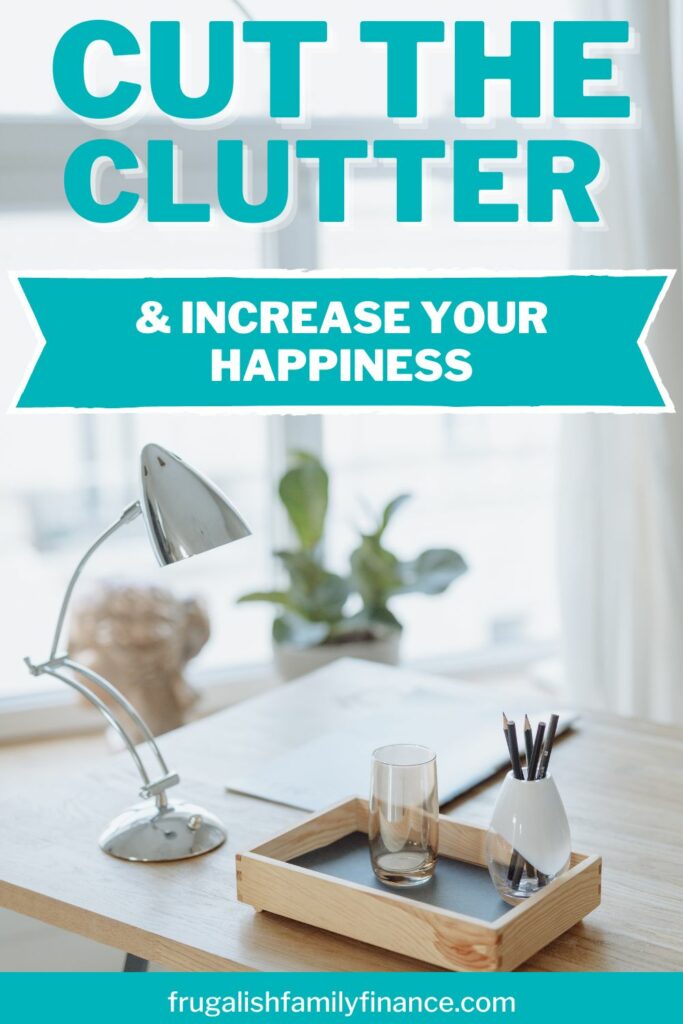
Ways to Minimize Your Life and Live with Less
When we talk about clutter, it’s not just the material items we need to minimize. Clutter can manifest in several different ways.
- Financial clutter
- Schedule clutter
- Mental or emotional clutter
- Digital clutter
- Physical clutter
So, let’s dig deeper and discuss the different kinds of clutter and how to minimize your life.
Financial Clutter
Financial clutter can be a pain point for many people. Constantly making payments, living paycheck to paycheck, and overspending can cause stress and negatively impact many aspects of your life.
Therefore, minimizing your finances will allow you to live financially stress-free. Here is how to minimize and take control of your finances.
Start Budgeting
The first step to financial stability is budgeting.
Creating a monthly budget will help you better control your money and where it is going.
To do this, look at your spending. Get rid of wasteful spending that is cluttering your budget and stealing your financial peace.
- Memberships or subscriptions you don’t use or need
- Subscription boxes
- Bad habits you’re wasting money on
Related: How to Create a Zero-Based Budget to Simplify Your Finances
Pay off debt
Debt is the main reason for financial stress and why people live paycheck to paycheck. Therefore, you need to figure out how to get rid of it as fast as you can.
Create a plan to pay off your debt. Then, determine how to increase your income to start paying off your debt.
- Make budget cuts to free up extra money in your budget.
- Sell stuff around the house to make extra money.
- Pick up extra shifts, get a second job, or start a side hustle to make extra money.
The quicker you pay off your debt, the less financial clutter you’ll have.
Related:
How to Slay Your Debt Using the Debt Snowball
Turn Clutter into Cash: How to Declutter and Make Money
Ultimate Guide for How to Get Sales on Poshmark in 2023
Live within your means
Stop trying to keep up with what you think you should have and buying stuff you can’t afford.
I get it! It’s tough to change this mindset. I still struggle sometimes when there is something I really want. We rationalize buying things and paying for services we can’t afford.
If you don’t have the money to pay cash for it, then you don’t need it (at least right now). Saving for the things you need or want will make you appreciate them even more when you buy them.
Moreover, learning to do things yourself can save you a ton of money. Youtube is an excellent resource for learning new skills for free!
Related:
5 Secrets to Master Your Money Mindset
Everything You Need to Know About Sinking Funds for Beginners
Save for emergencies
Have a savings account dedicated to unplanned or emergency expenses. Having money saved for emergencies lessens financial stress and keeps you out of debt.
Schedule Clutter
How many of us commit to things we really don’t want to do?
Keeping our schedule full of humdrum activities and tasks on a regular basis creates unnecessary stress and busyness.
Now there will be things we just have to suck up and get through, but limiting those commitments will help to cut back on calendar clutter.
Here is how to minimize your schedule or calendar clutter.
Prioritize
Think about what makes you happy, what brings you joy, and who you want to be. What does that look like?
Use these questions to prioritize your time for the things and people that bring you happiness.
Furthermore, try to prioritize your work for a better work-life balance.
Learn to say no
Time is a limited resource, and we shouldn’t spend it doing stuff we hate.
Learn to say no to things on your calendar that doesn’t make you happy.
It will be uncomfortable at first because we feel obligated to go or feel like we may hurt someone’s feelings. But this does more harm than good. We end up feeling resentful that we had to go and miserable while we’re there.
Make time for things you enjoy
Find out what fills your cup, and do more of that. It’s important that we take care of ourselves and make sure our tank is full so that we can be the best version of ourselves for our loved ones.
So, try doing less of what you don’t want to do and more of what you do.
- Take a nap.
- Read a book.
- Soak in the tub.
- Walk around Target with your big ass cup of Starbucks.
- Spend time with friends.
- Leave the kids with your spouse and go on a date night with yourself!
Digital Clutter
Do you ever just get sick of your phone? Like you get stressed out just looking at it?!
The number of emails, text messages, apps, notifications, and more is ridiculous and just plain overwhelming sometimes.
Here are a couple of ways to decrease your digital clutter.
Turn off notifications
The push and constant notifications when people post are just too damn much. I don’t want to be notified about every little thing that goes on with the apps on my phone. The constant vibrating and dinging is a distraction causing you to lose focus.
Turn off all unnecessary apps and notifications. Furthermore, go through your apps and get rid of the ones you don’t use or that encourage wasting time. Put only the important apps on your home screen.
Silence Your Phone
Silence your phone when you don’t want to be interrupted, especially at night when sleeping.
And if it’s your day off, don’t answer work calls. You’re not obligated to unless you’re willing to cover a shift or talk about work stuff. Your day off is your day off!
Set boundaries for time off to create a better work-life balance. This will keep you from feeling burnt out and help you recharge.
Unsubscribe to email subscriptions
An inbox full of sales and junk emails is really annoying! You sign up for one discount code or freebie, and the next thing you know, you get hundreds of emails daily.
Go through and unsubscribe from the emails as you get them. Anything that you automatically delete is what you need to unsubscribe from.
Be more intentional about who you give your email to. If you’re looking for a coupon, there are apps you can use instead.
- Retailmenot
- Ebates
- Honey
- Mr Rebates
Furthermore, treat your inbox like a to-do list. Read and answer emails that need a reply, and then delete them. If you need to save them, temporarily file them into a saved file. But remember to go through them regularly so that you keep them clutter-free.
Limit social media
Social media is a time suck! Not to mention it can lead to negativity, making us feel inadequate. These negative emotions can lead to comparison and overspending.
Therefore, unfollow people and pages that make you feel negative emotions. Why would you continue to follow if something makes you feel anxious, angry, or inadequate?
Another way to limit social media is to set a timer for how long you can scroll. This will help control your screen time and ensure you’re using your time effectively and staying focused.
Also, taking a break from social media and screen time is a way to reconnect with your life. You’d be surprised how life-changing a few days away from social media can be!
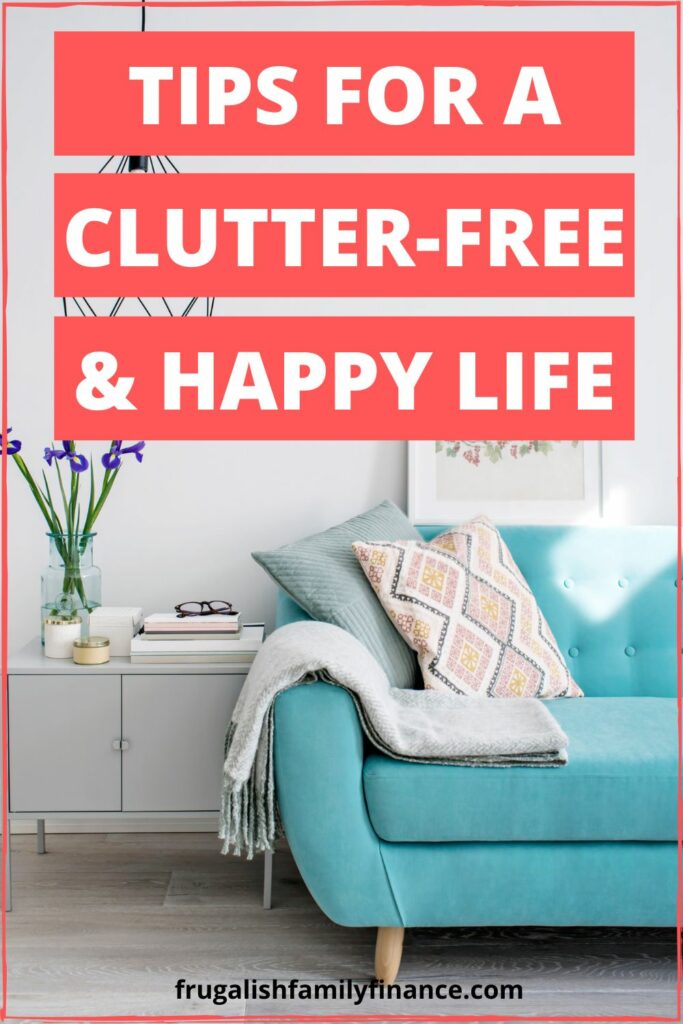
Mental or emotional clutter
Mental and emotional clutter is the worst! The endless to-do list, feelings of inadequacy, and relationships that drain you can wreak havoc on your mental health.
Here are a couple of ways to decrease your mental and emotional clutter.
Limit goals
Don’t get me wrong! You definitely should have goals, but unrealistic goals or too many goals at once can be overwhelming and cause much stress.
Therefore, set realistic and time-oriented short and long-term goals. Don’t just say, “I’m going to save money,” you have to figure out the who, what, where, and whys to make it happen.
I like to use SMART goals.
- Specific: Your goals should be super specific.
- Measurable: How are you going to measure and track your progress?
- Achievable: Decision time. Can you reasonably accomplish this goal? How are you going to achieve the goal? What tools do you need?
- Relevant: Big picture of your goal. Does this goal contribute in some way to your overall happiness? Is it possible in this season of life you’re in?
- Time-bound: What is your start date and deadline?
Using this method helps you choose the most important goals and create a plan of action to get there. This way, you don’t have a bunch of broad goals that you have no idea how to execute.
Stop the multi-tasking
I don’t know about you, but I was pretty much born multi-tasking! I can remember getting into trouble in school because I would read a book in between quiz questions.
It just gets worse as we become adults. You would think doing 2-3 tasks all at once would help you get what you need to get done faster, right?
But, multi-tasking (most times) is the opposite.
- It’s inefficient.
- Causes inability to focus.
- Increases mental clutter that leads to stress.
Instead of multi-tasking, create a list of to-dos for the day and prioritize them by importance. Then, tackle the tasks one at a time from most important to least important.
This way, you can focus on that one task, produce quality work, and get everything done without distraction.
Toxic relationships
This one is a hard one. Toxic people can be a drain on your mental health, finances, time, and energy.
Sometimes, it’s not as simple as cutting ties (although that’s not easy either). This is why boundaries are so important. Setting boundaries for what you will tolerate is essential for protecting your overall well-being.
Personally, I have always been a people pleaser and really struggle with setting boundaries. But I always fall back on something my mom said years ago, “surround yourself with people that build you up, not tear you down.”
Therefore that is how I approach my relationships. I want to surround myself with people who build me up and cut out those who tear me down because my time and energy are better spent creating a life I love.
Find a way to vent
Sometimes you have to do a huge brain dump just to get all the clutter out of your head and free up some mental space.
Writing everything down in a journal can help you make sense of things. Other times talking to someone like a friend, family member, or therapist can help to challenge any negative thoughts and prioritize the mental clutter.
Physical Clutter
Physical clutter is another huge pain point. Your home should be where you feel safe and can relax from the day’s stressors. If your home is full of clutter that makes you anxious and irritable, it may be time to embrace more of a minimalist mindset!
Here are a couple of tips to minimize your home space.
Stop bringing stuff in
Start with a spending freeze. Set a specific amount of time that you’re not allowed to spend money on non-essential things. This will help to see how you’re spending your money and help you to be more intentional with the spending your doing.
When buying things, ask yourself these questions…
- Can I afford it?
- Is the item a quality piece?
- Did I research the item?
- Have I thought about it for 24-48 hours, or is this an impulse want?
- Does it have a purpose in my home?
Asking yourself these questions will help you make more intentional purchases to cut out the clutter.
Related: How to Rock a Spending Freeze Challenge to Save Money
Start the purge
Tackle one room at a time. Get rid of the easy stuff first, things that are broken or you don’t want.
Next, move on to things you haven’t used in last six months. Continue on until everything in your home has a purpose and a home.
Related: Minimalism for Beginners: How to Simplify and Enjoy Your Life
Experiences over stuff
Most of us have way too much stuff. Instead of buying more stuff (you probably won’t use it), use that money and put it towards an experience. Not only is this good for your mental health, but something you and you’re family will remember for your whole life (unlike a plastic toy or expensive purse).
Create a capsule wardrobe
You don’t need more closet space…you need a capsule wardrobe.
Put together a wardrobe that you can mix and match for different outfits. Avoid fast fashion, and choose quality pieces you love that will last. A capsule wardrobe will save you money and simplify your mornings for the entire family.
Here are a couple of resources for creating a capsule wardrobe…
Conclusion
Embracing a minimalist mindset and cutting back on things that cause mental, emotional, and physical clutter can help to increase your overall happiness. Therefore, take an inventory of your life and start cutting out the clutter so you can live the life you want.

